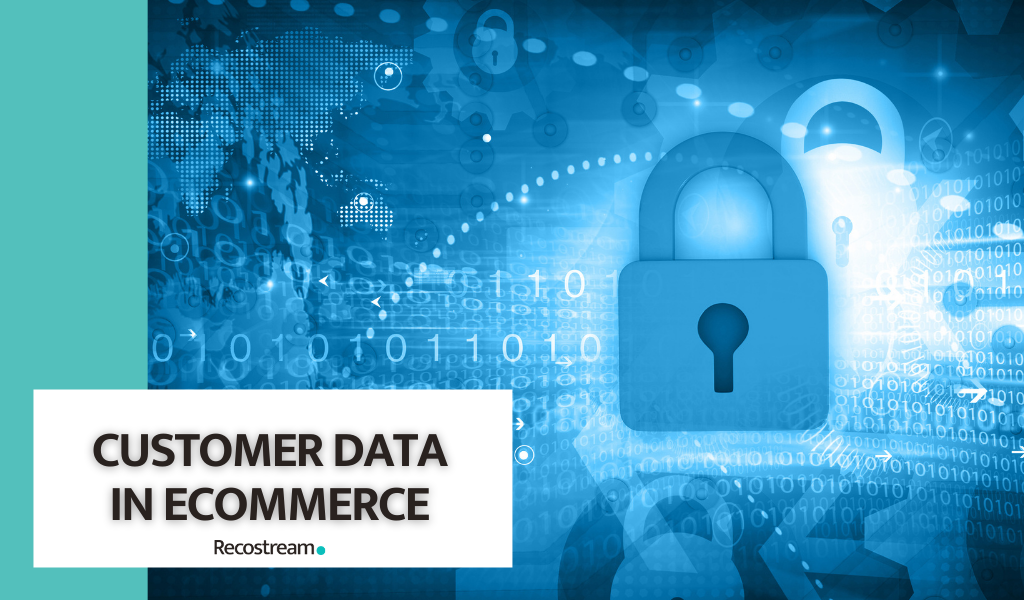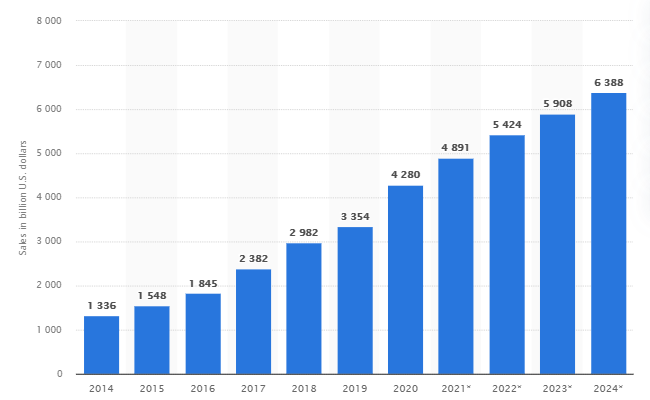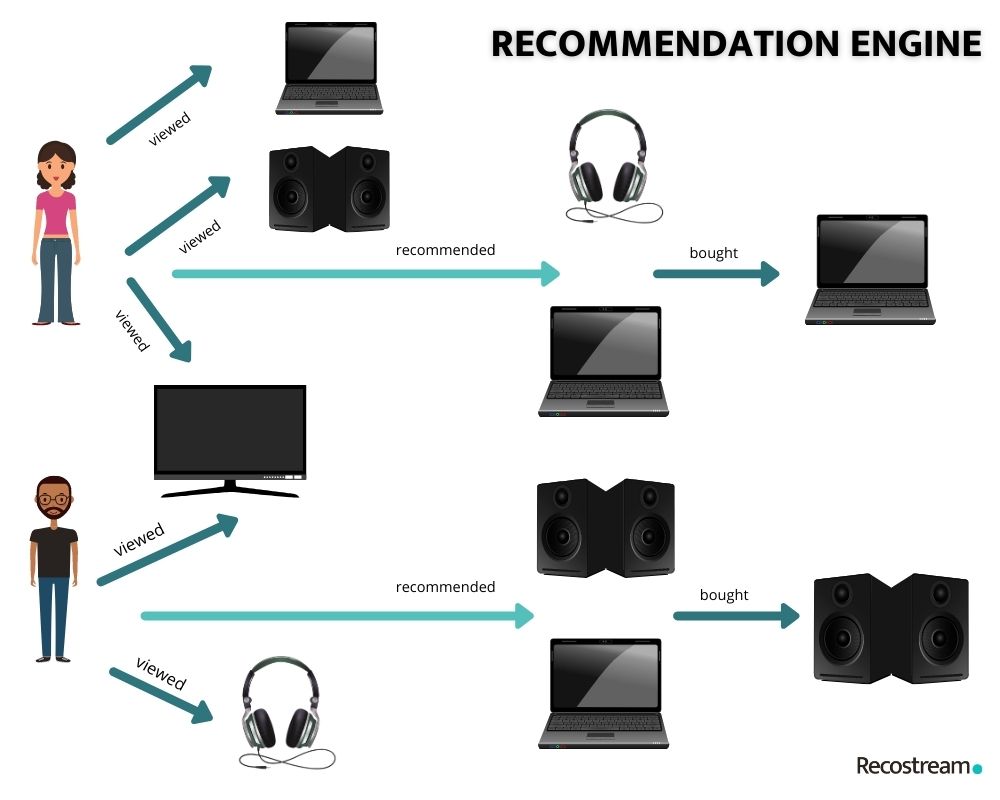Customer Data in eCommerce: How Do Online Stores Collect and Manage Information About Website Users?
.png)
Customer data is a resource indispensable for the functioning of eCommerce. Thanks to the proper management of database, the shopping experience can be better and the store can increase sales. This is a sensitive topic in terms of security and building customer trust. However, proper data collection and management can contribute to the development of the store.
Customer data in eCommerce: how do online stores collect and manage information about website users?
In today's article we will cover the following topics:
- eCommerce data in 2021
- Customer data - what is it?
- How do online stores collect data about their customers?
- How do eCommerce websites process and use data sets about their customers?
- What are the benefits of good customer data management in your online store?
- What tools can help internet businesses manage customer data?
-
How to protect the data of online store customers?

Customer data and the challenges facing the eCommerce market in 2021
The beginning of the second decade of the 21st century is probably one of the most turbulent periods in the eCommerce market.
It has been estimated that US consumers spent $ 861.12 billion online in 2020, which constitutes a 44 percent increase as compared to the previous year.
According to the latest data, in 2020 more than two billion people used the offers of online stores and bought goods or services online. In the same year, eCommerce sales globally exceeded $ 4.2 trillion.

The record increase in the popularity of online stores has recently shown that the eCommerce market is a great alternative for ambitious investors.
It is estimated that there are between 12 and 24 million eCommerce sites worldwide, with more online stores being created every day.
Due to this, the eCommerce market is very competitive and online companies are looking for various ways to stay one step ahead of the competition.
This is reason why more and more online stores notice the value of their customer data in developing and improving their business.
From strategic planning to advanced analytics and inventory management to personalizing and improving customer experiences, customer data is a very powerful tool for eCommerce websites.
What is customer data?
Customer data stands for all information that online store customers provide when interacting with the online store website. Either through a mobile application, surveys, social media channels or marketing campaigns - in many steps the customer leaves information about oneself that may be valuable for the online store.
We can distinguish 4 most important types of customer data :
Personal data
this is data related to basic information necessary to make a purchase. They can be divided into two categories: Personal Data (PII) containing information such as the customer's first and last name, address or credit card details, and non-PII data related to cookies, device ID and the general location.
Behavioral data
this covers transaction data, user interaction with various store functionalities and device information. This information helps to analyze the dependencies and buying habits that customers reveal when shopping online.
Engagement data
refers to any user interactions with the store, browsing the offered products and likes on social channels. This customer data provides valuable insight into the performance of your store's marketing strategy.
Customer feedback data
this includes customer reviews and opinions about the store and products, as well as the results of various types of surveys.

Customer data collection in online stores - why is it so important?
There are many ways in which customer data can influence and improve your store's operations. The eCommerce industry experts listed the most important of them:
1. Better understanding of the needs and interests of the store's customers
Conducting store analytics allows you to verify which products are the most popular and to find the relationship between the purchasing preferences of individual users.
2. Higher level of customer service
Up to 84% of online store customers said eCommerce customer service is one of the key factors influencing purchasing decisions.
Customer information gathered via post-checkout surveys can improve customer service and create more helpful FAQ pages, newsletters, and communication.
3. Predicting the demand
While forecasting demand, customer data is used to predict potential interest in products or services. This can significantly help you lower your operating costs (in particular storage costs) and improve the efficiency of your online
store.
.png)
4. Attracting new customers
Converting casual visitors into loyal customers is a real challenge for eCommerce website owners and requires both marketing skills and strategic thinking.
Collecting customer data can be of great assistance in this aspect as well by monitoring traffic obtained through social media platforms and measuring the effectiveness of marketing efforts.
5. Improve cart abandonment and customer retention rates
According to Statista data, up to 88% of orders in online stores were abandoned before they were finalized. In order to improve the bounce rate, analyzing customer data will be particularly important.
6. Personalization
The most important advantage of using data in the development of online business is the ability to personalize the customer purchasing experience. We will focus on this point for a while longer.
The data of the online stores users of allows you to get to know individual customers better. As a result, eCommerce sites are able to show them personalized content and offers, on the basis of their previous interactions with store tabs, past purchases and demographics.

According to Janrain's data, up to 74% of people will be discouraged from shopping in a given store if the recommendations shown are not adjusted to their preferences. Moreover, it is estimated that last year companies lost up to $ 756 billion due to poor eCommerce personalization.
Read more about eCommerce product recommendations on our blog.
How do online stores collect customer data?
There are many different ways your online store collects data from consumers. It is vital for eCommerce companies to collect this data responsibly.
There are three basic approaches on collecting data about online store customers:
- Direct user inquiry (in the case of personal data, informing the user and their consent is mandatory)
- Indirectly tracking users' movements through the store's tabs
- By adding customer data from other sources
Depending on the chosen approach, there are several ways and tools to obtain information about individual clients:
Cookies
The first and, to a large extend, one of the most popular tools to indirectly track the behavior of store customers are cookies. These are small text files that are stored by the visitor's web browser in their directory or data folders. They store customer data such as: customer ID or bookmarks that they visited and page elements with which they interacted.
.jpg)
Customer surveys and feedback forms
In order to get accurate opinions of individual customers on customer service, online stores often use customer surveys and feedback forms displayed after completing the order.
Online surveys not only help understand customer behavior and perspective but also collect eCommerce data to customer database.
Placing orders
In order to personalize offers and mailing campaigns, online stores also often use the personal data of customers obtained from orders. Personalization is one of the most powerful tool to improve customer experience and gain more loyal customers.
To use these marketing channels, a customer has to consent to the collection of data when placing the order.
These types of personalized mails are generally much more effective than classic mailing campaigns.
Social media
Most of eCommerce businesses have its channels on the most popular social media platforms such as Facebook or Instagram. They provide a source of customer data on the engagement, preferences and popularity of specific posts or stories.
Social media enables to reach a wider group of visitors and potencial customer. What is more, it is possible to collect customer information with Facebook Pixel and create a retarget campaign.
Chatbots
Chatbots are AI computer software that is used to chat with store customers with the use of a live chat interface. Conversation with users can take place directly on the store's website or via social media platforms and channels such as Facebook Messenger, Skype or Amazon Alexa.
The eCommerce chatbots are one of the essential elements of a modern online store. Thanks to this solution, it is possible to conduct conversational trading, i.e. the use of conversational interfaces in order to provide customers with a better shopping experience.
Chatbots need a large amount of customer data to function properly to train artificial intelligence algorithms to provide more and more accurate and helpful answers.
After successful implementation in eCommerce platform, intelligent chatbots can improve customer support and help users get answers to their questions quickly.
Personalized product recommendations
Another tool that uses customer data to improve stores and support sales is personalized product recommendation system.
To collect customer data, the recommendation engine use cookies. Altough this kind data sources user data are completely anonymous, they are still able to personalize the shopping experience of individual customers by recognizing their ID.
These systems use 3 basic types of data to generate lists of featured products:
- User behavior - pages visited, products added to the cart, etc.
- Product features - name, price, description, photo, video, category name, etc.
- User interaction with recommendations - clicks on recommendations.
The personalized recommendation engine uses two data filtering methods. Its results are effective and helpful for store customers:
- Content-based filtering - a method that analyzes data on available products and looks for relationships and similarities between them.
- Collaborative filtering - a method of analyzing the behavior of customers with similar tastes, trying to find similarities in the purchasing preferences of users.
Inventory management
In the eCommerce industry, it is said that stock shortage is a trillion dollar problem. It is estimated that the sellers all over the world annually lose about 984 billion US dollars because of unavailable products. In the United States alone, this amount is as high as $ 144.9 billion.
Due to this, the largest online stores try to intelligently use the collected data in order to better predict future demand for the offered products.
The most important advantages of implementing solutions that use customer data analysis to predict demand include, among others:
- Enabling optimization of the stock level,
- Better determination of times for placing re-orders,
- Maintain an "available to promise (ATP)" strategy.
Security of clients' personal data
Analyzing and collecting customer data in order to improve business efficiency has one more crucial aspect that every online retailer should remember - the security of personal data.
Consumers are often concerned about disclosing any personal information to companies.
Recent research shows that as many as 91% of consumers are "concerned" or "very concerned" about the privacy of their data on the Internet.
.png)
As many as 57% of online store customers declare that they will stop using the store's offer, which in their opinion has damaged their trust by using their personal data in an inappropriate way.
Moreover, up to half of consumers are willing to pay a higher price for products and services that protect personal data. In order to gain the trust of these clients, they must not only care about the privacy and security of their clients' data, but also pay attention to the company's culture and ethics.
The owners of online stores who collect customer data should therefore take care of the regulations and privacy policy in line with the GDPR.
Summary
Online store customer data offers many opportunities to improve your shopping experience. The use of various types of data sets aims at personalization, better customer service and a better understanding of users.
There are many comprehensive tools that use customer data analytics and artificial intelligence to support business, and integrating them with your store is childishly easy.